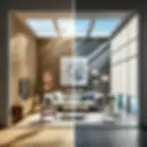Do Solar Shades Block Heat and UV Rays, or Just Sunlight?
- VU Window Treatments
- Sep 20, 2024
- 3 min read
Updated: Feb 7, 2025
Solar shades are a popular choice for homes and businesses, but many people wonder: Do solar shades block heat and UV rays, or just sunlight? The short answer is that solar shades do indeed block both heat and UV rays, but there’s much more to the story.
What Are Solar Shades Made Of?

Solar shades are typically made from a polyester weave, sometimes coated with PVC for added durability. These materials are specifically designed to allow light to pass through while filtering out harmful UV rays and reducing heat gain inside a room. Most solar shades feature a simple basketweave fabric, which is tightly woven to block out sunlight while still maintaining a level of visibility. In some cases, these fabrics can even be used for outdoor spaces like porches and patios, provided they come with specialized hardware to withstand the elements.
What It Means for UV and Heat Blocking

One of the key factors in determining the effectiveness of solar shades is the "openness factor." This refers to how tightly woven the fabric is. A lower openness percentage, like 1%, means that the fabric will block out 99% of UV rays and offer better heat reduction. However, the trade-off is reduced visibility to the outside.
Conversely, shades with a higher openness factor, such as 10%, allow more light and heat in but provide a better view. Therefore, when choosing solar shades, you’ll need to balance between your need for UV/heat protection and your desire for outside visibility.
Key takeaway: If you're looking for maximum UV and heat protection, opt for a lower openness factor. But if you want to maintain a clearer view, you may need to accept some compromise on heat blocking.
Dark vs. Light-Colored Fabrics: Which Is Better for Heat Reduction?

Another important choice you’ll have to make is whether to use dark or light-colored fabrics. The color of the fabric plays a significant role in how much heat and light the shades block. Dark fabrics tend to absorb more light, which helps to control glare but can increase heat absorption. On the other hand, light fabrics reflect more heat, making them more effective at reducing indoor temperatures.
Pros and Cons of Dark Fabrics:
Pro: Excellent at controlling glare due to their ability to absorb more light.
Pro: Better outdoor visibility during daylight hours.
Con: Dark fabrics absorb more heat, reducing their overall cooling effect.
Con: They offer less privacy at night, especially when interior lights are on.
Pros and Cons of Light Fabrics:
Pro: Better at reflecting heat, which helps reduce cooling costs.
Pro: They offer more privacy at night, as they reflect interior light.
Con: Reduced ability to see outside during the day.
Con: Less effective at glare control compared to dark fabrics.
Key takeaway: If your primary goal is to reduce cooling costs, light-colored fabrics are your best bet. However, if glare control and outside visibility are more important, dark fabrics may be the way to go.
The Benefits of Blocking UV Rays

Besides reducing heat, solar shades also offer significant benefits when it comes to UV protection. The sun's ultraviolet rays can cause furniture, carpets, and artwork to fade over time. By blocking up to 99% of UV radiation, solar shades can help preserve the interior of your home or office, saving you money on replacements and repairs.
In addition, UV protection is essential for skin health, especially for people who spend a lot of time indoors near windows. Solar shades provide an additional layer of defense against harmful UV exposure, even when you're inside.
Solar Shades for Energy Efficiency

Solar shades not only block heat and UV rays but can also contribute to overall energy savings. By reducing the amount of heat that enters your home, solar shades can lower your reliance on air conditioning during the hot months, thus reducing energy consumption. According to studies, window coverings that block out heat can reduce energy bills by as much as 25%. If you're designing an office space that prioritizes energy efficiency and style, explore Best Window Shades for Office Spaces to find the ideal solution. Solar shades act as a passive energy-saving tool, lowering heat gain and keeping your indoor environment cooler.
Key takeaway: Investing in solar shades can lead to significant energy savings, making them an environmentally friendly choice.
Why Solar Shades Are a Smart Investment
Solar shades do more than just block sunlight. They offer a full spectrum of benefits, including heat reduction, UV protection, and energy savings. With the right fabric and openness factor, they can be tailored to meet your specific needs—whether you prioritize privacy, glare control, or energy efficiency.
